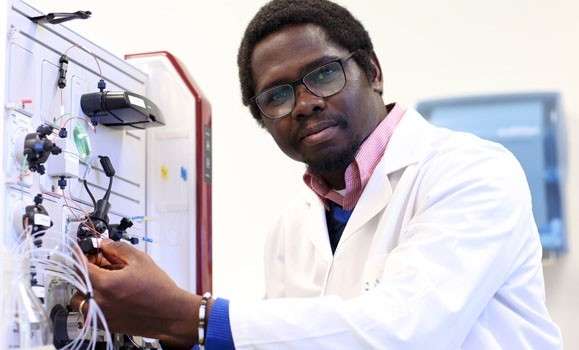Food chemist explores how peptides can improve our health

What if we could make the world a better place through the food we eat? What if our food counteracted certain diseases like cardiovascular disease and Type 2 diabetes? Faculty of Agriculture food chemist Chibuike Udenigwe is looking to do just that.
Dr. Udenigwe research looks at the components of food that could be used to promote and have a positive impact on human health. More specifically, he looks at short chains of proteins in food, called peptides, and how those peptides affect certain areas of human health.
"In a nutshell, it's the discovery of peptides from food," Dr. Udenigwe explains. "These peptides are derived from food proteins and we are trying figure out how they function in and affect the human body."
By looking at how these peptides function, Dr. Udenigwe explains that incorporating them into our food could have positive health benefits.
"Some of these peptides have been known to have an effect on cardiovascular disease," he says. "Others have been found to help the treatment or management of Type 2 Diabetes as well as some cardiovascular disease risk factors. We take the molecules and we put them into food using that as a delivery agent so people can actually get the health benefits."
Tapping proteins for the human food system
Dr. Udenigwe's research lab uses mostly dairy products, like yogurt and potatoes to extract the proteins. Not only is he looking to increase health benefits through food, but Dr. Udenigwe is adding value to low value agriculture products. His research looks at taking peptides from agricultural byproducts and putting them into the human food system to increase the health benefits.
"For example after dairy processing there are a lot of dairy byproducts," Dr. Udenigwe explains. "When the calf is weaned, the farm has a byproduct called colostrum. Colostrum is the first meal for the baby, but they don't use up everything. Colostrum has a lot of proteins. We can tap these proteins and bring them back into the human food system."
Dr. Udenigwe also explains that another good example is whey. After cheese making, the byproduct produced is whey which is filled with valuable proteins. Dr. Udenigwe and his research team are looking to use the proteins from these agricultural byproducts as a source of peptides and putting them back into the food system. For farmers, this research could add value to their low-value products.
"We are increasing the value of these byproducts and adding more money to the pockets of farmers who produce them," he explains. "That's one of the overall goals."
A team effort
Dr. Udenigwe doesn't conduct his research alone. He has a number of students who help him. At the moment, he has two masters students and a number of undergraduate students in his lab. He also has two or three undergraduate research students and a research assistant. Not only does he have a passion for his research, he has a passion for helping his students succeed.
"To see my students succeed is one of the things that actually drives me every day. I love to teach. My research program is a good way to deliver excellent curriculum to the students. I make them problem solvers."
Not only does Dr. Udenigwe teach his students to succeed in science careers, he teaches them valuable skills that they will be able to take to any career.
"I help them develop strong communication skills," he explains. "They learn how to communicate in written and verbal forms. Those are skills that are transferrable, even if they choose not to pursue science careers, they can take the communication skills everywhere."
As for Dr. Udenigwe, he aims to make the world a better place.
"If you look at the current situation here, some parts of the world are starving but other parts have excess, they produce lots of things and they waste a lot of things. I hope that we can start to change that."


















